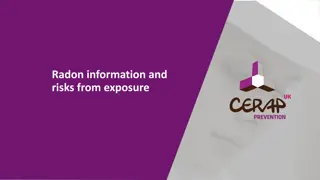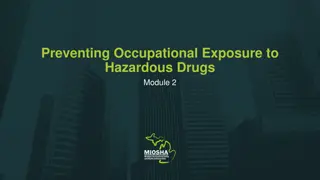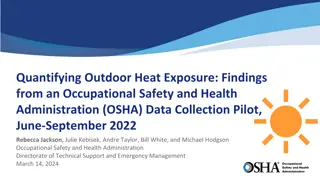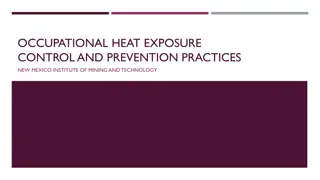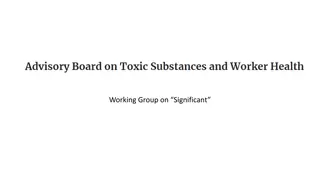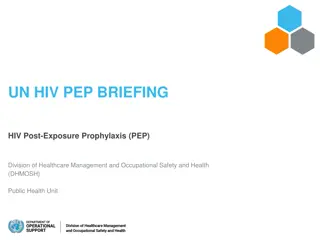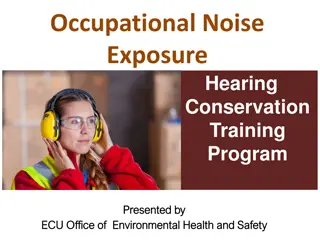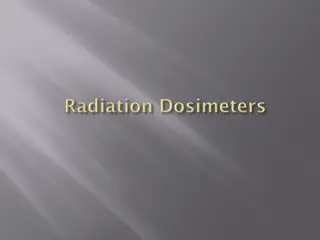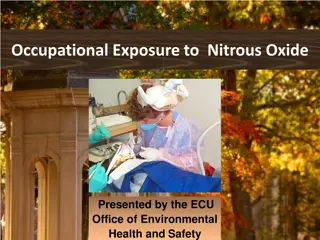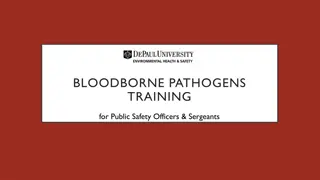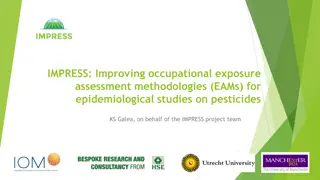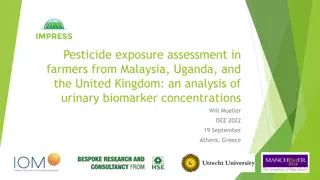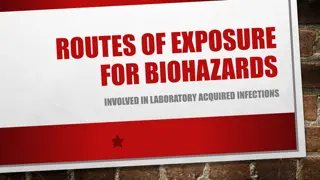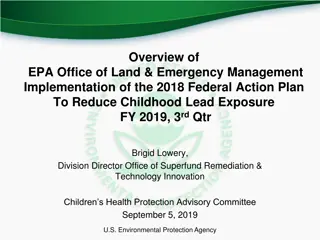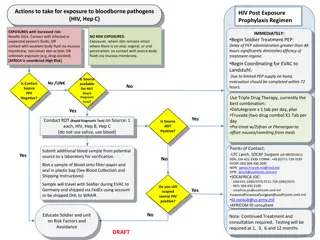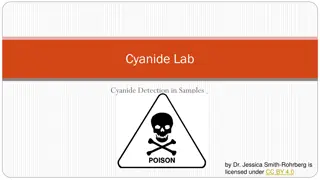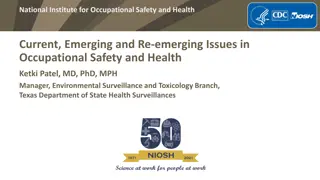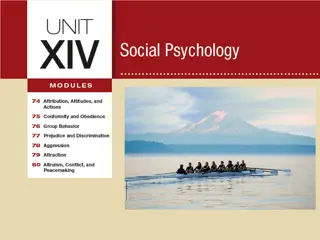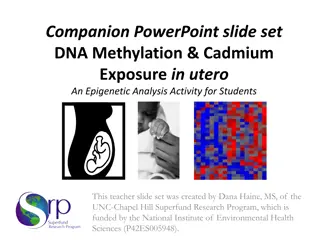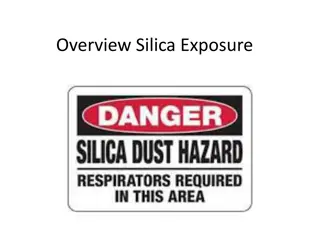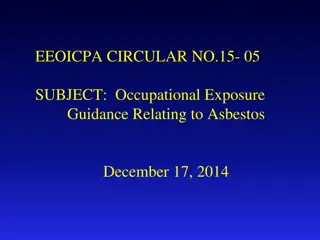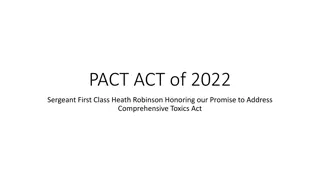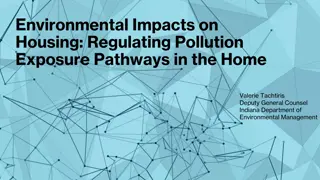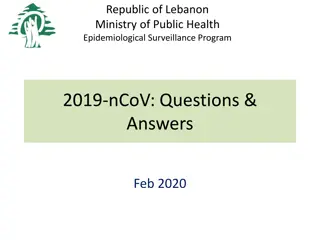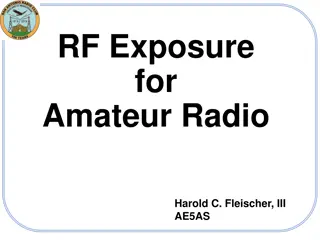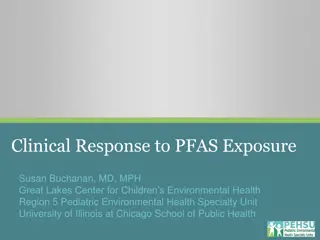Impact of NVIDIA Stock Surge on Mutual Funds and Passive Funds Exposure
NVIDIA's stock surged by 16% following strong financial performance, impacting various mutual funds and passive funds. Mutual funds like Motilal Oswal, Mirae, and Franklin have significant exposure to NVIDIA, while non-broad-based passive funds also hold substantial positions. The exposure of broad-
4 views • 10 slides
Understanding Risk Management in Environmental Geography and Disaster Management
Risk management in environmental geography and disaster management involves assessing the potential losses from hazards, evaluating vulnerability and exposure, and implementing strategies to mitigate risks. It includes calculating risk, dealing with risk through acceptance, avoidance, reduction, or
1 views • 10 slides
Credit Finance Sub-Group and NPRR Updates
Updates from the Credit Finance Sub-Group include discussions on operational NPRRs, new invoice reports, EAL changes, and DC Energy's exposure calculations. The group considered improvements in credit implications, concentration limits, and more. NPRR 1186 was reviewed for enhancements to ESR monito
0 views • 12 slides
Understanding Radon Exposure Risks and Prevention Measures
Radon is a colorless, odorless radioactive gas present in rocks and soils. It can enter buildings through cracks and pipes, posing health risks like lung cancer. Exposure to radon can lead to radiation damage to cells and increase the risk of cancer. It's essential to be aware of radon levels in ind
1 views • 14 slides
Understanding NHANES Data for Environmental Exposure Studies
National Health and Nutrition Examination Survey (NHANES) is a crucial population-based survey in the U.S. that collects data on health and nutritional status. This data supports various applications, including assessing human exposure to environmental chemicals. NHANES conducts biomonitoring to qua
5 views • 27 slides
Preventing Occupational Exposure to Hazardous Drugs: Module 2 Overview
This training module focuses on preventing occupational exposure to hazardous drugs, covering routes of exposure, hierarchy of controls, recommended procedures, and control measures. Prior review of Module 1 is advised for a comprehensive understanding of the topic.
1 views • 33 slides
Insights on Outdoor Heat Exposure: OSHA Data Collection Pilot 2022
The Occupational Safety and Health Administration (OSHA) conducted a Data Collection Pilot from June to September 2022 to quantify outdoor heat exposure and assess employer heat illness prevention programs. Key findings include identifying elements of successful prevention programs, comparing workpl
0 views • 22 slides
Environmental Hazards Faced by Veterans and Agent Orange Exposure Locations
Veterans may have been exposed to a variety of environmental hazards during their military service, including Agent Orange-related diseases, Gulf War illnesses, radiation-related diseases, traumatic brain injury, and more. Agent Orange exposure locations include Vietnam, C-123 airplanes, Blue Water
1 views • 40 slides
Occupational Heat Exposure Control and Prevention Practices
Occupational Heat Exposure Control and Prevention Practices at the New Mexico Institute of Mining and Technology covers training for workers exposed to excessive heat, pre-test evaluation, objectives focusing on heat stress and exposure, understanding heat and heat stress, human body's response to h
1 views • 37 slides
Understanding the Significance of Exposure in EEOICPA Procedures
Delve into the complexities of exposure assessment in the context of EEOICPA procedures, examining the nuances of significant exposure levels and their impact on causation determination. Explore proposed recommendations for refining exposure assessment metrics to enhance causation evaluation.
0 views • 9 slides
Understanding HIV Post-Exposure Prophylaxis (PEP) and Prevention
HIV Post-Exposure Prophylaxis (PEP) is a crucial emergency medical response for individuals exposed to HIV, aiming to prevent infection. It involves a regimen of medications, tests, and counseling services initiated within 72 hours of exposure. HIV transmission occurs through body fluids like blood,
3 views • 27 slides
Occupational Noise Exposure and Hearing Conservation Training Program
Learn about the Occupational Noise Exposure and Hearing Conservation Training Program presented by the Office of Environmental Health and Safety at ECU. This program aims to educate workers about the risks of noise-induced hearing loss, the importance of prevention, and the selection of appropriate
1 views • 20 slides
Understanding Radiation Dosimeters for Occupational Exposure Monitoring
Radiation dosimeters, like Thermoluminescent Dosimeters (TLD), are vital tools for measuring occupational exposure to ionizing radiation. TLDs work by storing energy from radiation exposure in crystals, which is later released as light when heated for measurement. Dosimeters are assigned to specific
0 views • 18 slides
Nitrous Oxide Occupational Exposure Guidelines and Monitoring
This information covers the occupational exposure to nitrous oxide, including its uses, chemical description, routes of exposure, health effects, monitoring methods, and regulatory exposure limits. Nitrous oxide is a colorless gas with various applications in medical, dental, and food processing ind
2 views • 18 slides
Bloodborne Pathogens Training for Public Safety Officers & Sergeants
Bloodborne pathogens (BBPs) are pathogenic microorganisms found in human blood that can cause diseases like HIV, Hepatitis B, and Hepatitis C. Public safety officers and sergeants face occupational exposure to BBPs and should follow OSHA's BBP Standard to protect themselves. Training, vaccinations,
0 views • 41 slides
Understanding Radiation Safety for XL2 Analyzers
The Niton Model XL2 analyzer uses an X-ray tube that emits radiation when turned on, requiring adherence to the ALARA principle to minimize exposure. Factors like time, distance, and shielding play crucial roles in managing radiation exposure. Learn how to stay safe while using the XL2 analyzer to e
0 views • 11 slides
Understanding Occupational Exposure to Formaldehyde
Occupational exposure to formaldehyde is common in various industries and settings, including medical laboratories and mortuaries. Formaldehyde is used as a preservative, embalming agent, and in the manufacture of various products. It poses health risks through inhalation and skin exposure, potentia
0 views • 14 slides
Honey Bee Exposure to Pesticides: Routes and Impacts
Analysis by the U.S. Environmental Protection Agency outlines various exposure routes of honey bees to pesticides, including contact with contaminated sources like foliage and soil, ingestion of contaminated pollen and nectar, and inhalation of chemical droplets. Different application types and age
2 views • 13 slides
Enhancing Pesticide Exposure Assessment for Epidemiological Studies
Focuses on IMPRESS project aiming to improve methodologies for assessing occupational pesticide exposure in epidemiological studies. Reviews challenges in retrospective exposure assessment, proposes methodologies, and presents key project results to date, emphasizing the use of various exposure asse
1 views • 15 slides
Pesticide Exposure Assessment in Farmers from Malaysia, Uganda, and the United Kingdom
This study evaluates the impact of pesticide exposure on farmers' health in Malaysia, Uganda, and the UK using urinary biomarker concentrations. Multiple cohorts are analyzed to assess associations between exposure-modifying factors and urine metabolite measurements. The IMPRESS project focuses on i
0 views • 12 slides
Understanding Personal Exposure to Polybrominated Diphenyl Ethers (PBDEs)
This presentation explores the exposure of individuals to PBDEs in residential indoor air, highlighting the background, commercial uses, exposure pathways, and previous studies on PBDEs. It discusses the objectives, methods, results, and conclusions of a study aiming to quantify indoor air exposure
0 views • 22 slides
Laboratory-Acquired Infections: Routes of Exposure and Prevention Measures
The content discusses laboratory-acquired infections from 1930 to 2015 and highlights exposure routes such as facial mucous membranes, percutaneous, ingestion, inhalation, and non-traditional routes like eye and nasal cavity. It emphasizes the importance of biosafety practices, identifies GI pathoge
0 views • 21 slides
Understanding Lead Exposure and Environmental Hazards
Lead, a soft metal abundant in the environment, has been used for various purposes throughout history. Exposure to lead can lead to serious health issues, especially in children. The impact of lead on public health and the environment, including its presence in gasoline and its effects on human heal
1 views • 17 slides
EPA Office of Land & Emergency Management Overview on Lead Exposure Reduction
EPA's Office of Land & Emergency Management (OLEM) implements various programs to address lead contamination, focusing on reducing childhood lead exposure through cooperative efforts at federal, state, tribal, and local levels. OLEM supports an integrated approach to addressing multiple lead exposur
0 views • 9 slides
Photography Basics: Understanding Camera Exposure and Metering
Explore the fundamentals of camera exposure, including aperture, shutter speed, ISO, and metering modes. Learn how to control exposure settings, utilize different metering modes, and troubleshoot common exposure issues to enhance your photography skills.
0 views • 15 slides
Bloodborne Pathogens Exposure: HIV Post Exposure Prophylaxis Regimen
Take immediate action for exposure to bloodborne pathogens like HIV and Hepatitis C through a post-exposure prophylaxis (PEP) regimen. Administer PEP within 48 hours for increased-risk exposures like needle sticks or contact with infected fluids. Coordinate evacuation if needed and conduct Rapid Dia
0 views • 5 slides
Understanding Cyanide: Sources, Exposure, and Risks
Cyanide is a toxic compound found in various forms such as gases, solids, and liquids that can be harmful to humans and animals. Sources of cyanide exposure include natural processes, industrial activities, plant sources, and combustion products like cigarette smoke. The extent of poisoning depends
0 views • 14 slides
Occupational Pesticide Safety and Health Concerns
Occupational safety and health issues related to pesticide exposure are a significant concern globally. Limited surveillance data on pesticide exposure and related illnesses are available, with a high percentage of farmers being affected annually. Various occupations beyond farming also face potenti
1 views • 25 slides
Understanding Attraction and the Mere Exposure Effect
Explore the dynamics of attraction and romantic love, delving into why we are drawn to certain individuals and how familiarity influences our feelings. Uncover key factors such as proximity, attractiveness, and similarity, along with the intriguing concept of the mere exposure effect, which elucidat
0 views • 37 slides
Understanding DNA Methylation and Cadmium Exposure in Utero: An Epigenetic Analysis
Explore the complex relationship between DNA methylation and in utero exposure to cadmium through a set of informative slides created by Dana Haine, MS. Learn about the impacts of DNA methylation on gene expression and how changes in methylation levels can lead to gene silencing or activation. Disco
0 views • 8 slides
Occupational Safety and Health Concerns with Crystalline Silica Exposure
Crystalline silica exposure poses serious health risks, including chronic silicosis, lung cancer, COPD, and kidney diseases. OSHA addresses this issue through programs like NEP, enforcing exposure limits, and requiring safety measures in the construction industry such as respiratory protection and e
0 views • 23 slides
Occupational Exposure Guidance Relating to Asbestos
Asbestos-related diseases such as asbestosis, lung cancer, and mesothelioma pose risks to workers, especially those in specific occupations. The EEOICPA Circular No. 15-05 provides guidance on assessing potential asbestos exposure for Department of Energy (DOE) workers post-1986, emphasizing the nee
0 views • 18 slides
PACT ACT of 2022: Addressing Comprehensive Toxics Exposure for Veterans
The PACT ACT of 2022, spearheaded by Sergeant First Class Heath Robinson, aims to address comprehensive toxics exposure issues for veterans. The bill includes provisions such as expanded healthcare, improved VA services, recognition of burn pit exposure, enhancement of compensation for Persian Gulf
0 views • 22 slides
Understanding Economic Exposure in International Finance
Explore the concepts of economic exposure and translation exposure in international finance through a case study of Savor Co., a U.S. firm with business units in Europe. Learn how regression analysis is used to assess exposure to currency movements and identify potential hedging strategies to mitiga
0 views • 24 slides
Understanding Environmental Impacts on Housing: Regulating Pollution Exposure Pathways
Explore the regulatory framework for managing pollutant exposure in homes, highlighting the complexity of exposure pathways and the importance of assessing risks based on toxicity and exposure levels. The discussion covers various exposure pathways such as drinking water, air quality, dermal contact
0 views • 14 slides
Guidelines for Suspecting and Managing 2019-nCoV (COVID-19) Infection
Guidelines provided by the Ministry of Public Health in Lebanon highlight the criteria for suspecting a 2019-nCoV (COVID-19) infection, including illness onset and exposure factors. It outlines symptoms to look for, such as fever and respiratory issues, as well as exposure scenarios like travel to C
0 views • 23 slides
RF Exposure for Amateur Radio: Understanding Sources and Safety Measures
Exploring the various sources of RF exposure in relation to amateur radio, this comprehensive guide by Harold C. Fleischer, III AE5AS sheds light on different antennas like those used by AM, FM radio stations, TV stations, MW telecommunications, police, taxis, and even Wi-Fi routers. Each image show
0 views • 39 slides
OSHA's Respirable Crystalline Silica Rule Overview
Exposure to respirable crystalline silica can lead to serious health risks including silicosis, lung cancer, COPD, and kidney disease. The rule covers the scope of coverage, permissible exposure limits, exposure assessment methods, and requirements for construction sites. It emphasizes the importanc
0 views • 31 slides
Clinical Response to PFAS Exposure in the General Population
Exposure to PFAS (per- and polyfluoroalkyl substances) is prevalent among Americans, with pregnant women showing detectable levels. Screening for health effects of exposure includes assessing cholesterol, thyroid function, and other symptoms. There is no known safe level of PFAS exposure, and orderi
0 views • 14 slides
Understanding the Long-Term Effects of Lead Exposure
Lead exposure can have detrimental effects on individuals, especially children. From damaging neurons to causing behavioral issues and slow development, the impact of lead exposure can be severe. Prevention through identifying sources of exposure and living safely with lead is crucial. Lead test kit
0 views • 13 slides



